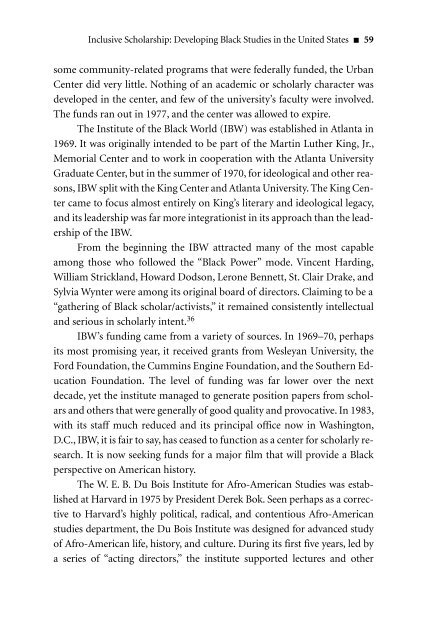Inclusive Scholarship: Developing Black Studies - Ford Foundation
Inclusive Scholarship: Developing Black Studies - Ford Foundation
Inclusive Scholarship: Developing Black Studies - Ford Foundation
You also want an ePaper? Increase the reach of your titles
YUMPU automatically turns print PDFs into web optimized ePapers that Google loves.
<strong>Inclusive</strong> <strong>Scholarship</strong>: <strong>Developing</strong> <strong>Black</strong> <strong>Studies</strong> in the United States 59<br />
some community-related programs that were federally funded, the Urban<br />
Center did very little. Nothing of an academic or scholarly character was<br />
developed in the center, and few of the university’s faculty were involved.<br />
The funds ran out in 1977, and the center was allowed to expire.<br />
The Institute of the <strong>Black</strong> World (IBW) was established in Atlanta in<br />
1969. It was originally intended to be part of the Martin Luther King, Jr.,<br />
Memorial Center and to work in cooperation with the Atlanta University<br />
Graduate Center, but in the summer of 1970, for ideological and other reasons,<br />
IBW split with the King Center and Atlanta University. The King Center<br />
came to focus almost entirely on King’s literary and ideological legacy,<br />
and its leadership was far more integrationist in its approach than the leadership<br />
of the IBW.<br />
From the beginning the IBW attracted many of the most capable<br />
among those who followed the “<strong>Black</strong> Power” mode. Vincent Harding,<br />
William Strickland, Howard Dodson, Lerone Bennett, St. Clair Drake, and<br />
Sylvia Wynter were among its original board of directors. Claiming to be a<br />
“gathering of <strong>Black</strong> scholar/activists,” it remained consistently intellectual<br />
and serious in scholarly intent. 36<br />
IBW’s funding came from a variety of sources. In 1969–70, perhaps<br />
its most promising year, it received grants from Wesleyan University, the<br />
<strong>Ford</strong> <strong>Foundation</strong>, the Cummins Engine <strong>Foundation</strong>, and the Southern Education<br />
<strong>Foundation</strong>. The level of funding was far lower over the next<br />
decade, yet the institute managed to generate position papers from scholars<br />
and others that were generally of good quality and provocative. In 1983,<br />
with its staff much reduced and its principal office now in Washington,<br />
D.C., IBW, it is fair to say, has ceased to function as a center for scholarly research.<br />
It is now seeking funds for a major film that will provide a <strong>Black</strong><br />
perspective on American history.<br />
The W. E. B. Du Bois Institute for Afro-American <strong>Studies</strong> was established<br />
at Harvard in 1975 by President Derek Bok. Seen perhaps as a corrective<br />
to Harvard’s highly political, radical, and contentious Afro-American<br />
studies department, the Du Bois Institute was designed for advanced study<br />
of Afro-American life, history, and culture. During its first five years, led by<br />
a series of “acting directors,” the institute supported lectures and other

















